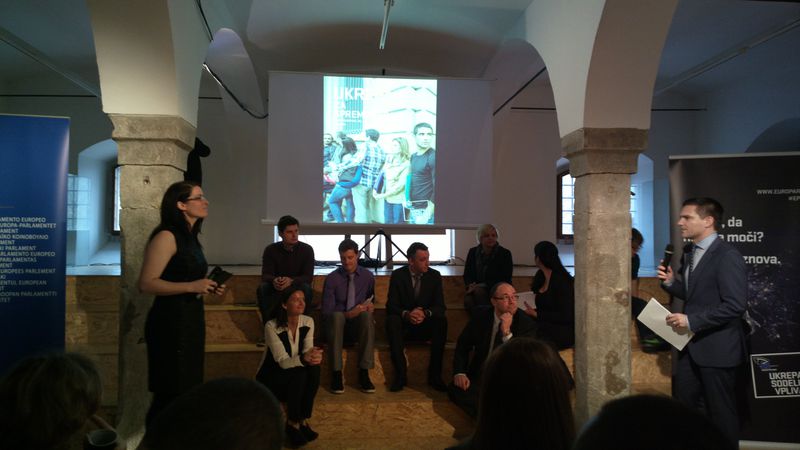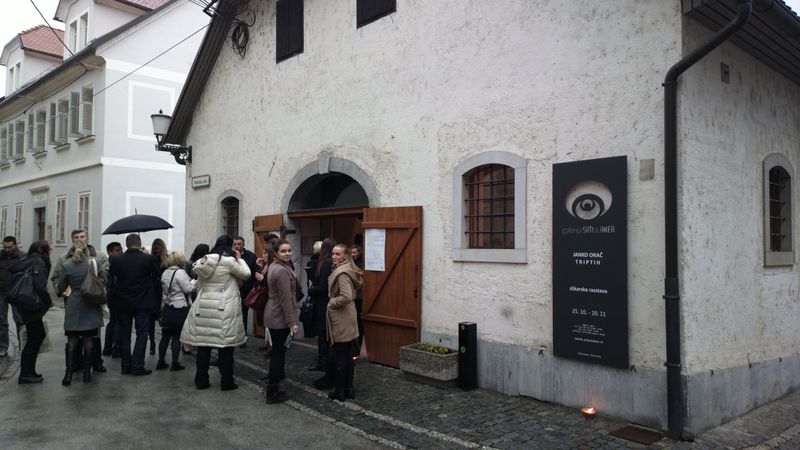Croatia Needs a Third National Consensus
Adelina Marini, November 25, 2013
"We had national consensus around the establishment of the state. We succeeded. It was not easy in the beginning, but it lasted 10 years. The next ten years we had consensus about Europe. In the beginning, too, not everything was smooth, but we succeeded. If you want the structural reforms to be realised, the reform of the education system, if you like, this cannot be done by a single political option". These are words of Croatian MEP from the EPP group Davor Ivo Stier, which he articulated during a very interesting trans-border meeting in Novo mesto, Slovenia. The discussion was organised by the information bureaus of the European Parliament in Zagreb and Ljubljana with a main topic how to tackle youth unemployment in the EU. Croatia is the third EU member state, after Greece and Spain, with highest level of unemployment among the young people - 52.8%. In Greece it is 57.3% and in Spain 56.5%.
Slovenia is not exactly in the group of the most affected countries, but the share of young unemployed of up to 25 years of age is not to be ignored - 23.7%. According to Davor Ivo Stier, it is great that the EU agreed the Youth Unemployment Guarantee of 6 billion euros, of which the Croatian measures to fight it would get 66 million euros. Much less than the money Belgium will receive, for instance, the MEP said, recalling that the Belgian problem is remarkably less severe than the Croatian. But no matter how good the programmes are, the genuine solution is recovery of the economy and the key for that is structural reforms. Reforms are needed of the labour legislation, the healthcare system and even the credit system. This means to do things in such a way that banks stop buying state bonds only but part of their capital to go to the small and medium sized enterprises.
But to realise these reforms national political consensus is needed and currently there is no such, Mr Stier said later in an interview with this website (the entire interview you can watch in the attached video file). A single political force cannot realise on its own reforms that, in their essence, are long-term and fundamental. The initiative should come from the governing coalition because they are elected and have the power to initiate a dialogue. We have to put aside the cross-party shootings and gather together to see what kind of a Croatia do we want after the crisis is gone because the crisis in Europe will pass and will Croatia benefit from it to position itself better or will it lag behind, asked rhetorically the MEP from the Croatian Democratic Union (HDZ).
Among the things which a consensus needs to be built on in the Croatian society and political elite is the role of the state in the economy. At the moment, the interference of politics and the state apparatus in the entire economy is too big. The tax burden is also high and should be reduced, which needs a reform of the treasury. That, for its part, requires reforms of those sectors that need public money the most. Those are the healthcare system, the pension and education system. Croatia invests only 0.7% of its gross domestic product in research and development, while the EU's common goal is 3 per cent. China has set a goal in its strategy to invest 5 per cent. This is the solution. Besides, Croatia needs a comprehensive development strategy which also requires national consensus, Mr Davor Ivo Stier pointed out.
The unemployment - a national priority
One of the severest consequences of the euro area debt crisis is the record high unemployment in the EU at large, but mainly in the peripheral states - Spain, Portugal, Greece - and especially among the young people because of which we need to add Croatia, Bulgaria, Italy. Milan Kostro, PR mentor in the Zagreb incubator for entrepreneurs, said during the two-hour long discussion in the small Slovene town of Novo mesto on November 16th, that, alas, for the government this topic is not a priority. He was disappointed that, at the unemployment summit earlier in November in Paris, instead of saying that from now on this will be the main priority of his government, the Croatian prime minister said he doubted the  precision of the statistical data. It is not important whether the young jobless are 52% or less than 50 per cent. It is a fact that this is a very serious problem, not only for Croatia, the mentor added.
precision of the statistical data. It is not important whether the young jobless are 52% or less than 50 per cent. It is a fact that this is a very serious problem, not only for Croatia, the mentor added.
The government should also prioritise joining Schengen because the removal of borders would enhance trans-border activities, which will have an impact on employment and business. But how can this happen since Croatia reciprocally introduced counter labour restrictions for the citizens of all EU member states that have such measures for the labour mobility of Croats. The list is quite long: Austria, Belgium, Cyprus, France, Greece, Italy, Luxembourg, Malta, The Netherlands, Germany, Slovenia, Spain, UK. For now the restrictions are for two years, but if any of these countries would expand them Croatia will retaliate in the same way. And during the discussion in Novo mesto it was mentioned that in border regions it is much easier for Slovenes to find work in Croatia, even in Zagreb, than in Ljubljana, for instance. And vice versa. The good infrastructure between the two countries is a good precondition for mutual exchange of labour force, business and for a commonness of markets in general.
Another problem that was singled out during the discussion, i which experts, NGOs and MEPs from Slovenia and Croatia participated in, was that currently the unemployment measures are always indirect. And not that it is a problem to finance incubators, business zones, organisations for training and skills, students exchange, etc. The problem is that this is not enough, explained Andrijana Paric from the Razbor company which deals with EU projects. Moreover, the political level discourse in the EU leaves the impression that only incentives for the ICT sector are sought as if it is expected all young people to be creative and able to create applications that can be sold to Yahoo or Google for 2 million dollars. What are we going to do with those who are not creative? Some might want to be florists, hairdressers or else, she said.
Last but not least, it is very difficult for startups to get access to starting capital. All European projects require own funding which is very hard. That is why the small drops that are being given cannot create a huge river. The way the EU funds are programmed must be radically changed, Andrijana Paric added. It is necessary the political elite to have the capacity to make the right decisions, suggested Dragan Nikolic, the Croatian presenter from the Croatian Radio and TV. Politics needs to realise what is necessary to be done and not keep the remote and most dependent regions of Croatia under control, added Milan Kostro. In Croatia, for instance, there are big disparities in the development of the regions in the country. There is a need for a change of mentality, too, added Davor Ivo Stier, who quoted a recent case with the biggest air plane in the world - the Ukrainian Antonov - which was in the headlines of all Croatian media after it landed at the Zagreb airport recently.
No one paid any attention to the reasons why the air plane had arrived in Croatia, which were to load up transformers produced by the company Koncar (an electrical giant from the Yugoslavia times) in  cooperation with the German Siemens. The delivery is for the Philippines. Instead, the MEP said, all media focused on the fact that the biggest air plane in the world was in Zagreb.
cooperation with the German Siemens. The delivery is for the Philippines. Instead, the MEP said, all media focused on the fact that the biggest air plane in the world was in Zagreb.
Andrijana Paric mentioned also the problem with the lack of preparedness to launch tenders for the EU programmes, especially those under the European Social Fund, where there are delays with programming both on part of the EU and of Croatia. She forecast that the programmes will not be ready to launch at least by the end of next year and even by mid-2015, which means that already prepared projects in the ICT area will be outdated at the time they are to be approved and the contracts are signed. The candidates will have lost competitiveness and markets. She gave the example of Hungary which opened tenders six months before its EU accession to allow the EU funds flow from day one.
Regretfully, due to the lack of translation from Slovene language it was hard to understand what the experience of Slovenia is, which currently is struggling to come out of the severest economic and financial crisis in its history of an independent state. This year the EU leaders agreed the European youth unemployment guarantee which amounts to 6 billion euros. It is aimed at boosting youth employment and any programmes that can ensure work or continuation of education within the fourth month of registration on the labour market. The aid is available for all who are not registered in labour offices as well. The member states are those, however, who will decide what measures to undertake. Against the backdrop of the available labour restrictions, however, the recommendation of the Council to the European Commission to boost labour mobility, both within the member states and between them, sounds a bit cynical.
Obviously, apart from a national consensus on the needed structural reforms, a common European consensus will be neededa again about what can and cannot be done at European level. Organising such discussions in a much larger scale could help finding the right guidelines for such a consensus.
 Kolinda Grabar-Kitarovic | © KGK
Kolinda Grabar-Kitarovic | © KGK Jozo Rados | © European Parliament
Jozo Rados | © European Parliament Aleksandar Vucic, Andrej Plenkovic | © Vlada RH
Aleksandar Vucic, Andrej Plenkovic | © Vlada RH